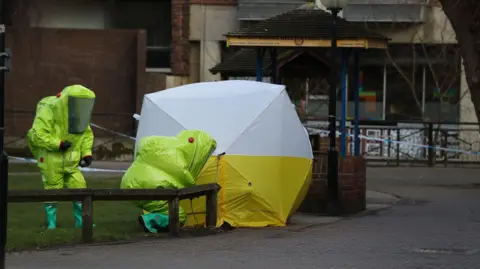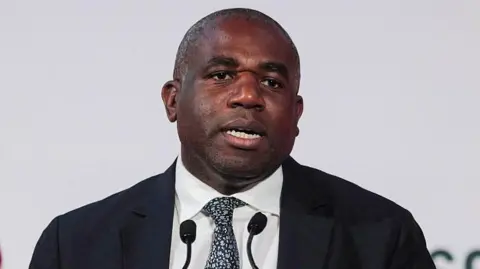UK sanctions Russian spies for malicious activity
 PA Media
PA MediaA number of Russian spies have been sanctioned for conducting a "sustained campaign of malicious cyber activity" including in the UK, the Foreign Office has said.
Three military intelligence units from Russia's GRU espionage agency and 18 officers have had sanctions placed on them for allegedly "spreading chaos and disorder on [Russian President Vladimir] Putin's orders".
UK Foreign Secretary David Lammy linked the activity to the UK's continued support of Ukraine, and said GRU spies were "running a campaign to destabilise Europe".
Separately, the European Union placed its "strongest sanctions" yet on Russia, which Ukrainian President Volodymyr Zelensky called "essential and timely".
The latest EU measures, announced on Friday, included a ban on transactions related to the Nord Stream natural gas pipeline and lowering a cap on the price at which Russian oil can be bought.
The UK joined the move to lower the price cap, with Chancellor Rachel Reeves saying Europe was "turning the screw on the Kremlin's war chest".
They come as European allies hope to ratchet up the pressure on Russia to bring the three-year-long war in Ukraine to an end.
But former Russian President Dmitry Medvedev, a close ally of Putin, said his nation's economy would survive the sanctions and that Moscow will continue striking Ukraine "with increasing force".
The EU sanctions are the 18th round of such measures since Russia's full-scale invasion of Ukraine began in 2022.
The aim is to undermine Moscow's ability to finance its war on Ukraine - something Western sanctions have so far failed to achieve, as Russia has increased its oil exports to China and India and operates a so-called shadow fleet of oil tankers around the globe.
 Getty Images
Getty ImagesWhitehall officials say today's sanctions imposed by the UK on 18 Russian GRU military intelligence officers is "the biggest action against Russian spies" since the aftermath of the Salisbury Novichok poisonings in 2018.
The latter was more significant as it involved the wide scale expulsion of Russian "diplomats", whereas those GRU officers outed today are presumed to be back in Russia.
The UK Foreign Office said one of the intelligence units it had sanctioned - Unit 26165 - had been involved in targeting Mariupol, including a strike that hit the Ukrainian city's theatre, killing hundreds of civilians.
It said it had also placed measures on intelligence officers who placed spyware on the phone of Yulia Skripal, who with her father was targeted by suspected Russian agents in Salisbury with the nerve agent Novichok.
The Foreign Office added that Russia had targeted UK media organisations, telecoms companies, energy infrastructure and political institutions.
"The Kremlin should be in no doubt: we see what they are trying to do in the shadows and we won't tolerate it," Lammy said in a statement. "Putin's hybrid threats and aggression will never break our resolve."
The BBC has contacted the Russian embassy for comment.
People or entities that are sanctioned can face a range of restrictions, including having financial assets frozen.
European leaders are also looking for the US to place further pressure on Russia.
Earlier this week, Donald Trump threatened Russia with severe tariffs if a peace deal was not reached within 50 days. The US president has become increasingly impatient with Putin.
The Foreign Office also announced sanctions on three leaders of the "African Initiative", a social media campaign it said was founded, funded and employed by Russia to conduct disinformation operations in West Africa.
Russia has previously denied any involvement in efforts to interfere with countries' democratic systems or of seeking to sabotage their economies.
